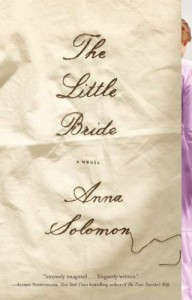

When 16-year-old Minna Losk journeys from Odessa to America as a mail-order bride, she dreams of a young, wealthy husband, a handsome townhouse, and freedom from physical labor and pogroms. But her husband Max turns out to be twice her age, rigidly Orthodox, and living in a one-room sod hut in South Dakota with his two teenage sons. The country is desolate, the work treacherous. Most troubling, Minna finds herself increasingly attracted to her older stepson. As a brutal winter closes in, the family's limits are tested, and Minna, drawing on strengths she barely knows she has, is forced to confront her despair, as well as her desire.
Amazon.com
It's the late 1880s. Minna Losk is a Jewish teen (16 yo) growing up in Odessa, in the Pale of Settlement. It's a time of war, strife and constant pogroms in the area. Fearing for her safety and wanting a new start somewhere else, Minna signs up for a program that ships young women to the United States as mail order brides. Minna is matched with a farmer in South Dakota. Once in SD, Minna sees that her soon to be husband is a good deal older than her (in his 40s) -- in fact, he has two sons close to Minna's age. He also seems to have a serious, quiet way about him. Though she doesn't immediately feel any particular romantic or sexual interest towards her new spouse, Minna tries to make the best of things, diving into learning skills needed for life on a farm. It doesn't take long for her to start feeling twinges of disappointment though. She starts to feel that she didn't so much escape previous hardships as much as just replace them with different ones. Not only does life on this farm prove to be made up of long hours of drudge work, but her new mister is really pushing for Minna to give him a new addition to the family. Problem is, Minna actually finds herself developing more interest in one of her stepsons than her husband. Things around the farm are about to get real sticky!
Where to start. Well, there was not much that I really liked in this novel. It opens with a pretty graphic description of Mina getting a female examination, which leads into an even more graphic description of a small bird being tortured. That was a small red flag for me, but I kept reading. Once Minna's story moves to South Dakota, my issue with the plot was that it was largely boring. Things moved very slowly but the family dynamics were so odd and creepy that I struggled to find the interest to continue. The synopsis on the back of the book (paperback edition) describes Minna as finding herself "increasingly attracted to her older stepson" but I wasn't convinced it had anything to do with him specifically.... I feel like it was more just her being less than enthused about the older man she was matched with, her new home is out in the middle of nowhere pretty much, and she's got a teenage stepson, Samuel, just a couple years older than her who likes to sneak up on her when she's bathing in the river. I think it was more like Samuel just struck her as the next best option. Doesn't mean it wasn't still weird, especially the way the stepson was written. To me, he came off as either not being all there or having a simmering rage problem... or a combination of the two.
That whole family just had a little too much ick factor for me. BUT, I will give some credit to Minna's husband, Max. He struck me as honestly trying to be a good, stand-up guy who tried to do right by her while trying to provide a mother figure to his sons. I couldn't help but blech a bit at his bedroom skills though.
I could see some similarity to the writing / tone between this novel and Willa Cather's O, Pioneers! But this book lacks Cather's finesse. I felt that at times there was an unnecessary level of crudeness to environment descriptions and dialogue. I'm not sure where the trend began where authors seem to equate crassness with literary merit and "edge" but it's rare that I see it done very well and more often than not it's a literary turn-off for me.

 2
2








